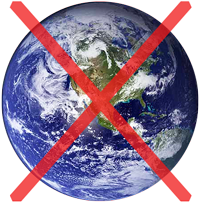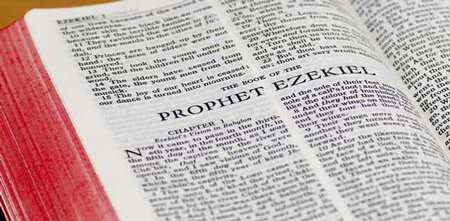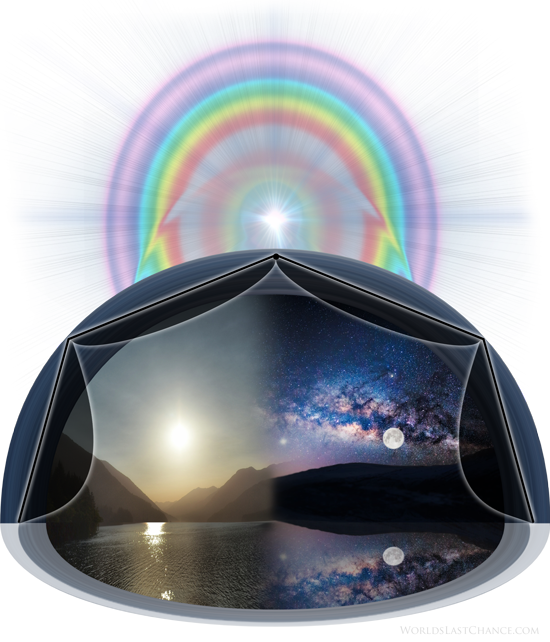Biblical Evidence for the Flat Earth | Part 2
The firmament is solid in nature:
In the following passage, Elihu in his conversation with Job confirms what we have already learned from the Creation account in Genesis, namely that the firmament that separates the waters and houses the heavenly bodies is solid. Note that Elihu uses H7554 (râqa‛), the root word of firmament, which means "by analogy to expand (by hammering); by implication to overlay (with thin sheets of metal): —beat, make broad, spread abroad (forth, over, out, into plates), stamp, stretch."
Hast thou with him spread out [H7554 - râqa‛] the sky, which is strong, and as a molten looking glass? (Job 37:18, KJV)
Now, let us examine a key passage often quoted by those advocating the globe model:
It is he that sitteth upon the circle [H2329 - chûg] of the earth, and the inhabitants thereof are as grasshoppers; that stretcheth out the heavens as a curtain, and spreadeth them out as a tent to dwell in. (Isaiah 40:22, KJV)
 The word used here to denote "circle" is H2329 (chûg). It quite literally means circle, circuit, or compass, and by extension can refer to the vault of the heavens. It does not mean "ball" or "sphere."
The word used here to denote "circle" is H2329 (chûg). It quite literally means circle, circuit, or compass, and by extension can refer to the vault of the heavens. It does not mean "ball" or "sphere."
H2329 - chûg
BDB Definition:
1) circle, circuit, compass
2) (BDB) vault (of the heavens)
H2329 (chûg) is in no way indicative of a ball or sphere. Isaiah, under divine inspiration, was deliberate in his word choice here; he did not lack a word for "ball," as can clearly be seen in the following passage:
He will surely violently turn and toss thee like a ball [H1754 - dûr] into a large country . . . (Isaiah 22:18, KJV)
Isaiah, when referring to a ball penned H1754 (dûr) not H2329 (chûg). These are mutually exclusive expressions.
It is important to note here that H2329 (chûg) can refer to the "vault of the heavens" which, in context, seems the most fitting application of its usage in this passage. Let us look at it again:
It is he that sitteth upon the circle [H2329 - chûg] of the earth, and the inhabitants thereof are as grasshoppers; that stretcheth out the heavens [H8064 - shâmayim] as a curtain, and spreadeth them out as a tent to dwell in. (Isaiah 40:22, KJV)
This passage tells us that Yahuwah sits upon the vault of the heavens above the Earth1 and that from His vantage point, the inhabitants of Earth appear like grasshoppers. Yahuwah, of course, is omnipresent and does not need to strain His eyes to see the inhabitants of Earth, but the picture that Isaiah is painting is quite clear.
This passage also tells us that Yahuwah stretches out the heavens [H8064 - shâmayim] like a "curtain" and spreads them out like "a tent." The word used here to denote "the heavens" is the same word used in Genesis to identify the firmament:
And Elohim called the firmament [H7549 - râqı̂ya‛] Heaven [H8064 - shâmayim]. And the evening and the morning were the second day. (See Genesis 1:8.)
What Isaiah is communicating then is that Father Yahuwah sits upon (or above) the firmament which is stretched over the Earth like a tent. (Scripture continually says that Yahuwah stretches out the heavens, or shâmayim: Psalm 104:2, Job 9:8, Isa. 40:22; 42:5; 44:24; 45:12; 51:13, Jer. 10:12; 51:15, Zec. 12:1)
Isaiah tells us that Father Yahuwah sits upon (or above) the firmament which He stretches over the Earth like "a curtain" or "a tent." (See Isaiah 40:22.) This analogy would make no sense in the context of a globe.
Eliphaz, in the book of Job, agrees with this interpretation, for he says that Yahuwah walks upon the chûg (H2329), the same word used by Isaiah to denote the vault of heaven:
 |
|
J.P. Green's literal rendering of Job 22:14 - |
Thick clouds are a covering to him, that he seeth not; and he walketh in the circuit [H2329 - chûg] of heaven [H8064 - shâmayim]. (Job 22:14, KJV)
Eliphaz clearly believed that Yahuwah dwelled [dwells] at the zenith of the firmament.
Is not El in the height of heaven [H8064 - shâmayim]? and behold the height of the stars, how high they are! (See Job 22:12.)
Solomon, in his commentary on the Creation account, reinforces what we have learned thus far from the pen of Moses, Isaiah, and the author of Job:
When he prepared the heavens [H8064 - shâmayim], I was there: when he set a compass [H2329 - chûg] upon the face of the depth: When he established the clouds above: when he strengthened the fountains of the deep: When he gave to the sea his decree, that the waters should not pass his commandment: when he appointed the foundations of the earth. (Proverbs 8:27-29, KJV)
Here, again, we find the same word used to identify the firmament, or the heavens: chûg (H2329)
|
"Praise ye Him, sun and moon: praise Him, all ye stars of light. Praise Him, ye heavens of heavens, and ye waters that be above the heavens. . . . for His name alone is excellent; His glory is above the earth and heaven." (Psalm 148:3-4, 13.) |
Solomon, in the above passage, is restating what Yahuwah did during Creation week (See Genesis 1:2.) In context, it appears that Solomon is speaking specifically about where the physical firmament rests upon the deep, for he says plainly after speaking about the preparation of the heavens [H8064 - shâmayim] that the chûg (H2329) was set "upon the face of the depth." Another very reasonable interpretation is that Solomon, here, is referring to the outer circle of ice established by Yahuwah to contain the seas, for he goes on to say that:
[H]e gave to the sea his decree, that the waters should not pass his commandment: when he appointed the foundations of the earth. (Proverbs 8:29, KJV)
Regardless of which of these interpretations one adheres to, one thing is certain: it is nowhere even hinted that the earth is a globe. All of the Biblical references examined so far irrefutably depict a flat earth enclosed by the firmament of heaven.
Let us now examine a most remarkable vision recorded by the prophet Ezekiel:
Now it came to pass in the thirtieth year, in the fourth month, in the fifth day of the month, as I was among the captives by the river of Chebar, that the heavens [H8064 - shâmayim] were opened, and I saw visions of Elohim. . . . And I looked, and, behold, a whirlwind came out of the north, a great cloud, and a fire infolding itself, and a brightness was about it, and out of the midst thereof as the colour of amber, out of the midst of the fire. Also out of the midst thereof came the likeness of four living creatures. . . . And the likeness of the firmament [H7549 - râqı̂ya‛] upon the heads of the living creature was as the colour of the terrible crystal, stretched forth over their heads above. And under the firmament [H7549 - râqı̂ya‛] were their wings straight, the one toward the other: every one had two, which covered on this side, and every one had two, which covered on that side, their bodies. And when they went, I heard the noise of their wings, like the noise of great waters, as the voice of the Almighty, the voice of speech, as the noise of an host: when they stood, they let down their wings. And there was a voice from the firmament [H7549 - râqı̂ya‛] that was over their heads, when they stood, and had let down their wings. And above the firmament [H7549 - râqı̂ya‛] that was over their heads was the likeness of a throne, as the appearance of a sapphire stone: and upon the likeness of the throne was the likeness as the appearance of a man above upon it. And I saw as the colour of amber, as the appearance of fire round about within it, from the appearance of his loins even upward, and from the appearance of his loins even downward, I saw as it were the appearance of fire, and it had brightness round about. As the appearance of the bow that is in the cloud in the day of rain, so was the appearance of the brightness round about. This was the appearance of the likeness of the glory of Yahuwah. And when I saw it, I fell upon my face, and I heard a voice of one that spake. (See Ezekiel 1:1,4,5,22-28.)
 Here, Ezekiel tells us:
Here, Ezekiel tells us:
- The heavens [H8064 - shâmayim] were opened. (See Ezekiel 1:1.)
- A whirlwind, a great cloud, a fire infolding itself came out of the north. (See Ezekiel 1:4.) The "north," in context here, seems to denote the zenith of the heavens, which were opened to him. Job agrees with this understanding: "He stretcheth out the north over the empty place . . ." (See Job 26:7)
- Out of this whirlwind of fire came four living creatures. (See Ezekiel 1:5.)
- After the living creatures come forth, Ezekiel sees the firmament [H7549 - râqı̂ya‛] "stretched forth over their heads." Ezekiel likens the firmament to a "terrible crystal." (See Ezekiel 1:22.) The word translated as "crystal" here is H7140 (qerach) which means "frost, ice, ice crystal." This suggests that the water above the firmament is frozen (or at least has the appearance of ice). This is likely what the Apostle John also saw in his vision: "Before the throne there was a sea of glass, like crystal. And in the midst of the throne, and around the throne, were four living creatures full of eyes in front and in back." (Revelation 4:6) The Greek word translated as "crystal" here is krustallos (G2930), which is "used in classical Greek for ice." (Vincent's Word Studies) Much more could be said about this, but it is not in the scope of this study to dig further into this particular goldmine.
- A voice called to the living creatures from the firmament [H7549 - râqı̂ya‛] that was above them. (See Ezekiel 1:25.)
- Ezekiel beholds Yahuwah on His throne above the firmament [H7549 - râqı̂ya‛]. (See Ezekiel 1:26-28.)
Ezekiel, here, has painted a remarkably vivid picture of Yahuwah seated in glory upon His throne above the firmament, which appears to him like an ice crystal.
The prophet confirms this picture yet again in another vision:
Then I looked, and, behold, in the firmament [H7549 - râqı̂ya‛] that was above the head of the cherubims there appeared over them as it were a sapphire stone, as the appearance of the likeness of a throne. (Ezekiel 10:1)
Isaiah, Eliphaz, Elihu, and Ezekiel all agree that Yahuwah is enthroned above a solid firmament. It appears that the Earth is in a literal sense Yahuwah's footstool:
Thus saith Yahuwah, The heaven [H8064 - shâmayim] is my throne, and the earth is my footstool: where is the house that ye build unto me? and where is the place of my rest? (See Isaiah 66:1.)
1 While this is an interpretation held by many Bible expositors, it might be fairly argued that the "circle of the earth" mentioned by Isaiah (Isa. 40:22) is actually a reference to the Earth's circular shape. This is certainly plausible. What the prophet is clearly not saying, though, is that the Earth is a globe.










